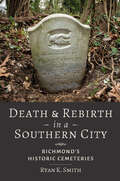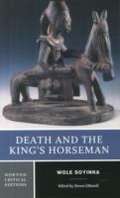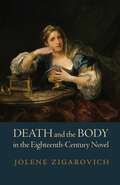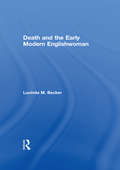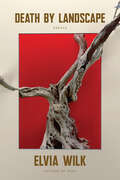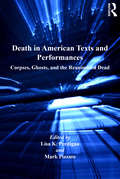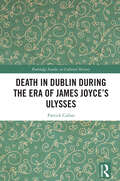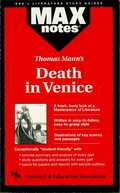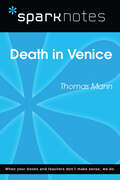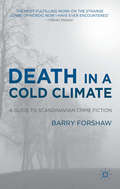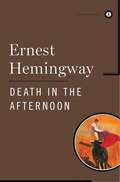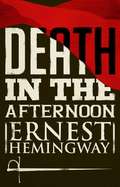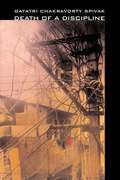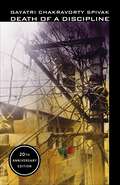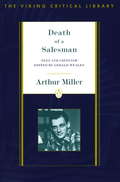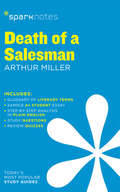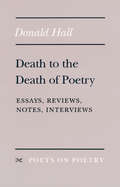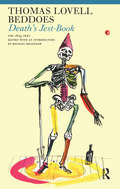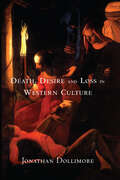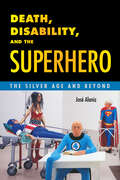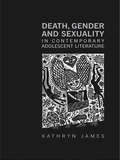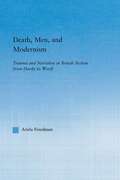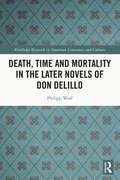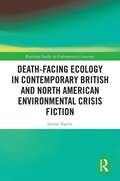- Table View
- List View
Death and Rebirth in a Southern City: Richmond's Historic Cemeteries
by Ryan K. SmithThis exploration of Richmond's burial landscape over the past 300 years reveals in illuminating detail how racism and the color line have consistently shaped death, burial, and remembrance in this storied Southern capital.Richmond, Virginia, the former capital of the Confederacy, holds one of the most dramatic landscapes of death in the nation. Its burial grounds show the sweep of Southern history on an epic scale, from the earliest English encounters with the Powhatan at the falls of the James River through slavery, the Civil War, and the long reckoning that followed. And while the region's deathways and burial practices have developed in surprising directions over these centuries, one element has remained stubbornly the same: the color line. But something different is happening now. The latest phase of this history points to a quiet revolution taking place in Virginia and beyond. Where white leaders long bolstered their heritage and authority with a disregard for the graves of the disenfranchised, today activist groups have stepped forward to reorganize and reclaim the commemorative landscape for the remains of people of color and religious minorities. In Death and Rebirth in a Southern City, Ryan K. Smith explores more than a dozen of Richmond's most historically and culturally significant cemeteries. He traces the disparities between those grounds which have been well-maintained, preserving the legacies of privileged whites, and those that have been worn away, dug up, and built over, erasing the memories of African Americans and indigenous tribes. Drawing on extensive oral histories and archival research, Smith unearths the heritage of these marginalized communities and explains what the city must do to conserve these gravesites and bring racial equity to these arenas for public memory. He also shows how the ongoing recovery efforts point to a redefinition of Confederate memory and the possibility of a rebirthed community in the symbolic center of the South.The book encompasses, among others, St. John's colonial churchyard; African burial grounds in Shockoe Bottom and on Shockoe Hill; Hebrew Cemetery; Hollywood Cemetery, with its 18,000 Confederate dead; Richmond National Cemetery; and Evergreen Cemetery, home to tens of thousands of black burials from the Jim Crow era. Smith's rich analysis of the surviving grounds documents many of these sites for the first time and is enhanced by an accompanying website, www.richmondcemeteries.org. A brilliant example of public history, Death and Rebirth in a Southern City reveals how cemeteries can frame changes in politics and society across time.
Death and The King's Horseman
by Wole Soyinka Simon Gikandi"Backgrounds and Sources" helps readers understand Death and the King's Horseman's traditional African contexts and the role of theater in African culture. Included are a map of Yoruba-land, discussions of Yoruban religious beliefs and cultural traditions, Soyinka on the various forms that theater has taken in African culture in order to survive, and Anthony Appiah on Soyinka's struggle with the problem of African identity in the creation of Death and the King's Horseman. Commentary on the play as both a theatrical production and a classroom text is provided by Gerald Moore, Tanure Ojaide, and Martin Rohmer. "Criticism" collects nine major essays on the play and the difficulties it presents to readers. Contributors include D. S. Izevbaye, Eldred Durosimi Jones, Henry Louis Gates Jr. , Biodun Jeyifo, Wole Soyinka, Joan Hepburn, Adebayo Williams, David Richards, and Olakunle George. A Chronology and Selected Bibliography are also included.
Death and the Body in the Eighteenth-Century Novel
by Jolene ZigarovichDeath and the Body in the Eighteenth-Century Novel demonstrates that archives continually speak to the period’s rising funeral and mourning culture, as well as the increasing commodification of death and mourning typically associated with nineteenth-century practices. Drawing on a variety of historical discourses—such as wills, undertaking histories, medical treatises and textbooks, anatomical studies, philosophical treatises, and religious tracts and sermons—the book contributes to a fuller understanding of the history of death in the Enlightenment and its narrative transformation.Death and the Body in the Eighteenth-Century Novel not only offers new insights about the effect of a growing secularization and commodification of death on the culture and its productions, but also fills critical gaps in the history of death, using narrative as a distinct literary marker. As anatomists dissected, undertakers preserved, jewelers encased, and artists figured the corpse, so too the novelist portrayed bodily artifacts. Why are these morbid forms of materiality entombed in the novel? Jolene Zigarovich addresses this complex question by claiming that the body itself—its parts, or its preserved representation—functioned as secular memento, suggesting that preserved remains became symbols of individuality and subjectivity. To support the conception that in this period notions of self and knowing center upon theories of the tactile and material, the chapters are organized around sensory conceptions and bodily materials such as touch, preserved flesh, bowel, heart, wax, hair, and bone. Including numerous visual examples, the book also argues that the relic represents the slippage between corpse and treasure, sentimentality and materialism, and corporeal fetish and aesthetic accessory.Zigarovich’s analysis compels us to reassess the eighteenth-century response to and representation of the dead and dead-like body, and its material purpose and use in fiction. In a broader framework, Death and the Body in the Eighteenth-Century Novel also narrates a history of the novel that speaks to the cultural formation of modern individualism.
Death and the Early Modern Englishwoman
by Lucinda M. BeckerThis study explores the female experience of death in early modern England. By tracing attitudes towards gender through the occasion of death, it advances our understanding of the construction of femininity in the period. Becker illustrates how dying could be a positive event for a woman, and for her mourners, in terms of how it allowed her to be defined, enabled and elevated. The first part of the book gives a cultural and historical overview of death in early modern England, examining the means by which human mortality was confronted, and how the fear of death and dying could be used to uphold the mores of society. Becker explores particularly the female experience of death, and how women used the deathbed as a place of power from which to bestow dying maternal blessings, or leave instructions and advice for their survivors. The second part of the study looks at 'good' and 'bad' female deaths. The author discusses the motivation behind the reporting of the deaths and the veracity of such accounts, and highlights the ways in which they could be used for religious, political and patriarchal purposes. The third section of the book considers how death could, paradoxically, liberate a woman. In this section Becker evaluates the opportunity for female involvement in dying and posthumous rituals, including funeral rites and sermons, commemorative and autobiographical writing and literary legacies. While accounts of dying women largely underpinned the existing patriarchy, the experience of dying allowed some women to express themselves by allowing them to utilise an established male discourse. This opportunity for expression, along with the power of the deathbed, are the focus for this study.
Death by Landscape
by Elvia WilkFrom the acclaimed author of the novel Oval comes a book of &“fan nonfiction&” about living and writing in the age of extinction In this constellation of essays, Elvia Wilk asks what kinds of narratives will help us rethink our human perspective toward Earth. The book begins as an exploration of the role of fiction today and becomes a deep interrogation of the writing process and the self. Wilk examines creative works across time and genre in order to break down binaries between dystopia and utopia, real and imagined, self and world. She makes connections between works by such wide-ranging writers as Mark Fisher, Karen Russell, Han Kang, Doris Lessing, Anne Carson, Octavia E. Butler, Michelle Tea, Helen Phillips, Kathe Koja, Jeff and Ann VanderMeer, and Hildegard von Bingen. What happens when research becomes personal, when the observer breaks through the glass? Through the eye of the fan, this collection delves into literal and literary world-building projects—medieval monasteries, solarpunk futures, vampire role plays, environments devoid of humans—bridging the micro and the macro and revealing how our relationship to narrative shapes our relationships to the natural world and to one another.
Death in American Texts and Performances: Corpses, Ghosts, and the Reanimated Dead
by Mark PizzatoHow do twentieth and twenty-first century artists bring forth the powerful reality of death when it exists in memory and lived experience as something that happens only to others? Death in American Texts and Performances takes up this question to explore the modern and postmodern aesthetics of death. Working between and across genres, the contributors examine literary texts and performance media, including Robert Lowell's For the Union Dead, Luis Valdez' Dark Root of a Scream, Amiri Baraka's Dutchman, Thornton Wilder's Our Town, John Edgar Wideman's The Cattle Killing, Toni Morrison's Sula and Song of Solomon, Don DeLillo's White Noise and Falling Man, and HBO's Six Feet Under. As the contributors struggle to convey the artist's crisis of representation, they often locate the dilemma in the gap between artifice and nature, where loss is performed and where re-membering is sometimes literally reenacted through the bodily gesture. While artists confront the impossibility of total recovery or transformation, so must the contributors explore the gulf between real corpses and their literary or performative reconstructions. Ultimately, the volume shows both artist and critic grappling with the dilemma of showing how the aesthetics of death as absence is made meaningful in and by language.
Death in Dublin During the Era of James Joyce’s Ulysses (Routledge Studies in Cultural History)
by Patrick CallanThe funeral of Paddy Dignam in James Joyce’s Ulysses serves as the pivotal event of the ‘Hades’ episode. This volume explores how Dignam’s interment in Glasnevin Cemetery allowed Joyce the freedom to consider the conventions, rituals and superstitions associated with death and burial in Dublin.Integrating the words and characters of Ulysses with its figurative locale, the book looks at the presence of Dublin in Ulysses, and Ulysses in Dublin. It emphasises the highly visible public role assigned to death in Joyce’s world, while also appreciating how it is woven into the universe of Ulysses. The study examines the role of Glasnevin Cemetery – where the Joyce family plot was opened in 1880 and remained in use for eight decades – as well as the social and medical problems associated with life in Dublin, a city divided by class, status, wealth and health. Nineteen burials took place in Glasnevin on 16 June 1904, and the analysis of this group illuminates the role of undertakers and insurers, along with the importance of memorialisation.This book is an important contribution to Joyce and Irish studies, as well as to international studies related to the treatment of the dead body and the development of garden cemeteries.
Death in Venice (MAXNotes Literature Guides)
by Boria SaxREA's MAXnotes for Thomas Mann's Death in Venice MAXnotes offer a fresh look at masterpieces of literature, presented in a lively and interesting fashion. Written by literary experts who currently teach the subject, MAXnotes will enhance your understanding and enjoyment of the work. MAXnotes are designed to stimulate independent thought about the literary work by raising various issues and thought-provoking ideas and questions. MAXnotes cover the essentials of what one should know about each work, including an overall summary, character lists, an explanation and discussion of the plot, the work's historical context, illustrations to convey the mood of the work, and a biography of the author. Each chapter is individually summarized and analyzed, and has study questions and answers.
Death in Venice (SparkNotes Literature Guide Series)
by SparkNotesDeath in Venice (SparkNotes Literature Guide) by Thomas Mann Making the reading experience fun! Created by Harvard students for students everywhere, SparkNotes is a new breed of study guide: smarter, better, faster.Geared to what today's students need to know, SparkNotes provides:chapter-by-chapter analysis explanations of key themes, motifs, and symbols a review quiz and essay topics Lively and accessible, these guides are perfect for late-night studying and writing papers.
Death in a Cold Climate
by Barry ForshawBarry Forshaw, the UK's principal crime fiction expert,presents a celebration and analysis ofthe Scandinavian crime genre, from Sjöwall and Wahlöö's Martin Beck series through Henning Mankell's Wallander to Stieg Larsson's demolition of the Swedish Social Democratic ideal in the publishing phenomenon The Girl with the Dragon Tattoo .
Death in the Afternoon
by Ernest HemingwayStill considered one of the best books ever written about bullfighting, Death in the Afternoon is an impassioned look at the sport by one of its true aficionados. It reflects Hemingway's conviction that bullfighting was more than mere sport and reveals a rich source of inspiration for his art. The unrivaled drama of bullfighting, with its rigorous combination of athleticism and artistry, and its requisite display of grace under pressure, ignited Hemingway's imagination. Here he describes and explains the technical aspects of this dangerous ritual and "the emotional and spiritual intensity and pure classic beauty that can be produced by a man, an animal, and a piece of scarlet serge draped on a stick." Seen through his eyes, bullfighting becomes a richly choreographed ballet, with performers who range from awkward amateurs to masters of great elegance and cunning. A fascinating look at the history and grandeur of bullfighting, Death in the Afternoon is also a deeper contemplation of the nature of cowardice and bravery, sport and tragedy, and is enlivened throughout by Hemingway's sharp commentary on life and literature.
Death in the Afternoon
by Ernest HemingwayStill considered one of the best books ever written about bullfighting, Death in the Afternoon is an impassioned look at the sport by one of its true aficionados. It reflects Hemingway's conviction that bullfighting was more than mere sport and reveals a rich source of inspiration for his art. The unrivaled drama of bullfighting, with its rigorous combination of athleticism and artistry, and its requisite display of grace under pressure, ignited Hemingway's imagination. Here he describes and explains the technical aspects of this dangerous ritual and "the emotional and spiritual intensity and pure classic beauty that can be produced by a man, an animal, and a piece of scarlet serge draped on a stick." Seen through his eyes, bullfighting becomes a richly choreographed ballet, with performers who range from awkward amateurs to masters of great elegance and cunning. A fascinating look at the history and grandeur of bullfighting, Death in the Afternoon is also a deeper contemplation of the nature of cowardice and bravery, sport and tragedy, and is enlivened throughout by Hemingway's sharp commentary on life and literature.
Death of a Discipline
by Spivak Gayatri ChakravortySpivak demonstrates how critics interested in social justice should pay close attention to literary form and offers new interpretations of classics such as Joseph Conrad's Heart of Darkness and Virginia Woolf's A Room of One's Own. The book offers close readings of texts not only in English, French, and German, but also in Arabic and Bengali.
Death of a Discipline (The Wellek Library Lectures)
by Gayatri Chakravorty SpivakFor almost three decades, Gayatri Chakravorty Spivak has been ignoring the standardized "rules" of the academy and trespassing across disciplinary boundaries. Today she remains one of the foremost figures in the study of world literature and its cultural consequences. In this new book she declares the death of comparative literature as we know it and sounds an urgent call for a "new comparative literature," in which the discipline is given new life—one that is not appropriated and determined by the market.In the era of globalization, when mammoth projects of world literature in translation are being undertaken in the United States, how can we protect the multiplicity of languages and literatures at the university? Spivak demonstrates how critics interested in social justice should pay close attention to literary form and offers new interpretations of classics such as Joseph Conrad's Heart of Darkness and Virginia Woolf's A Room of One's Own. Through close readings of texts not only in English, French, and German but also in Arabic and Bengali, Spivak practices what she preaches.Acclaim for Gayatri Chakravorty Spivak and her work:"[Spivak] pioneered the study in literary theory of non-Western women."—Edward W. Said"She has probably done more long-term political good, in pioneering feminist and post-colonial studies within global academia, than almost any of her theoretical colleagues." —Terry Eagleton"A celebrity in academia... create[s] a stir wherever she goes." —The New York Times
Death of a Discipline: Twentieth Anniversary Edition (The Wellek Library Lectures)
by Gayatri Chakravorty SpivakGayatri Chakravorty Spivak is among the foremost figures in the study of world literature and its cultural consequences of the past half-century. In this book, originally published in 2003, she declares the death of comparative literature as we know it and sounds an urgent call for a “new comparative literature,” in which the discipline is reborn—one that is not appropriated and determined by the market.Spivak examines how comparative literature and world literature in translation have fared in the era of globalization and considers how to protect the multiplicity of languages and literatures at the university. She demonstrates why critics interested in social justice should pay close attention to literary form and offers insightful interpretations of classics such as Joseph Conrad’s Heart of Darkness and Virginia Woolf’s A Room of One’s Own. Through readings of texts not only in English, French, and German but also in Arabic and Bengali, Spivak practices what she preaches.This anniversary edition features a new preface in which Spivak reflects on the fortunes of comparative literature in the intervening years and its tasks today.
Death of a Salesman
by Arthur Miller Gerald WealesThe Pulitzer Prize-winning tragedy of a salesman's deferred American dream Ever since it was first performed in 1949, Death of a Salesman has been recognized as a milestone of the American theater. In the person of Willy Loman, the aging, failing salesman who makes his living riding on a smile and a shoeshine, Arthur Miller redefined the tragic hero as a man whose dreams are at once insupportably vast and dangerously insubstantial. He has given us a figure whose name has become a symbol for a kind of majestic grandiosity--and a play that compresses epic extremes of humor and anguish, promise and loss, between the four walls of an American living room."By common consent, this is one of the finest dramas in the whole range of the American theater." --Brooks Atkinson, The New York Times"So simple, central, and terrible that the run of playwrights would neither care nor dare to attempt it." --Time
Death of a Salesman SparkNotes Literature Guide (SparkNotes Literature Guide Series #26)
by SparkNotesDeath of a Salesman SparkNotes Literature Guide by Arthur Miller Making the reading experience fun! When a paper is due, and dreaded exams loom, here's the lit-crit help students need to succeed! SparkNotes Literature Guides make studying smarter, better, and faster. They provide chapter-by-chapter analysis; explanations of key themes, motifs, and symbols; a review quiz; and essay topics. Lively and accessible, SparkNotes is perfect for late-night studying and paper writing. Includes:An A+ Essay—an actual literary essay written about the Spark-ed book—to show students how a paper should be written.16 pages devoted to writing a literary essay including: a glossary of literary termsStep-by-step tutoring on how to write a literary essayA feature on how not to plagiarize
Death to the Death of Poetry: Essays, Reviews, Notes, Interviews (Poets On Poetry)
by Donald HallDonald Hall believes that American poetry, at the present moment, thrives both in quality and in leadership. In his latest collection of essays, reviews, and interviews, Hall counters the increasingly publicized view that poetry has an ever-diminishing importance in contemporary American culture. He resents the endlessly repeated cliché that finds poetry unpopular and losing popularity. Thus: Death to the Death of Poetry. Throughout the pages of this latest offering in the Poets on Poetry series, Hall returns again and again to the theme of poetry's health, and offers essays praising contemporary poets, who serve as examples of poetry's thriving condition. In addition, Death to the Death of Poetry collects interviews in which Hall discusses the work of poetry--revisions, standards, the psychology and sociology of the poet's life. The collection will be warmly received by Donald Hall's large readership, enhanced in 1993 by publication of two exemplary volumes: The Museum of Clear Ideas, his eleventh book of poetry; and his essay Life Work, which brought him both new and returning readers. Donald Hall holds degrees from Harvard and Oxford and was recipient of the Lamont Poetry Selection Award, poetry editor for the Paris Review, and Professor of English, University of Michigan, before returning to his ancestral home in New Hampshire.
Death's Jest Book: The 1829 Text (Fyfield Bks.)
by Thomas Lovell BeddoesThis book is Thomas Lovell Beddoes's defining text, a pastiche Renaissance tragedy replete with treachery, murder, sorcery and haunting, the extravagant expression of the poet's lifelong obsession with mortality and immortality. It is a classic of the literature of death.
Death, Desire and Loss in Western Culture
by Jonathan DollimoreDeath, Desire and Loss in Western Culture is a rich testament to our ubiquitous preoccupation with the tangled web of death and desire. In these pages we find nuanced analysis that blends Plato with Shelley, Hölderlin with Foucault. Dollimore, a gifted thinker, is not content to summarize these texts from afar; instead, he weaves a thread through each to tell the magnificent story of the making of the modern individual.
Death, Disability, and the Superhero: The Silver Age and Beyond
by José AlanizThe Thing. Daredevil. Captain Marvel. The Human Fly. Drawing on DC and Marvel comics from the 1950s to the 1990s and marshaling insights from three burgeoning fields of inquiry in the humanities--disability studies, death and dying studies, and comics studies--José Alaniz seeks to redefine the contemporary understanding of the superhero. Beginning in the Silver Age, the genre increasingly challenged and complicated its hypermasculine, quasi-eugenicist biases through such disabled figures as Ben Grimm/The Thing, Matt Murdock/Daredevil, and the Doom Patrol.Alaniz traces how the superhero became increasingly vulnerable, ill, and mortal in this era. He then proceeds to a reinterpretation of characters and series--some familiar (Superman), some obscure (She-Thing). These genre changes reflected a wider awareness of related body issues in the postwar United States as represented by hospice, death with dignity, and disability rights movements. The persistent highlighting of the body's "imperfection" comes to forge a predominant aspect of the superheroic self. Such moves, originally part of the Silver Age strategy to stimulate sympathy, enhance psychological depth, and raise the dramatic stakes, developed further in such later series as The Human Fly, Strikeforce: Morituri, and the landmark graphic novel The Death of Captain Marvel, all examined in this volume. Death and disability, presumed routinely absent or denied in the superhero genre, emerge to form a core theme and defining function of the Silver Age and beyond.
Death, Gender and Sexuality in Contemporary Adolescent Literature (Children's Literature and Culture)
by Kathryn JamesKnowledge about carnality and its limits provides the agenda for much of the fiction written for adolescent readers today, yet there exists little critical engagement with the ways in which it has been represented in the young adult novel in either discursive, ideological, or rhetorical forms. Death, Gender and Sexuality in Contemporary Adolescent Literature is a pioneering study that addresses these methodological and contextual gaps. Focusing on texts produced since the late-1980s, and drawing on a range of theoretical perspectives, Kathryn James shows how representations of death in young adult literature are invariably associated with issues of sexuality, gender, and power. Under particular scrutiny are the trope of woman/death, the eroticizing and sexualizing of death, and the ways in which the gendered subject is represented in dialogue with the processes of death, dying, and grief. Through close readings of historical literature, fantasy fictions, realistic novels, dead-narrator tales, and texts from genres including Gothic, horror, and post-disaster, James reveals not only how cultural discourses influence and are influenced by literary works, but how relevant the study of death is to adolescent fiction--the literature of "becoming."
Death, Men, and Modernism: Trauma and Narrative in British Fiction from Hardy to Woolf (Literary Criticism and Cultural Theory)
by Ariela FreedmanDeath, Men and Modernism argues that the figure of the dead man becomes a locus of attention and a symptom of crisis in British writing of the early to mid-twentieth century. While Victorian writers used dying women to dramatize aesthetic, structural, and historical concerns, modernist novelists turned to the figure of the dying man to exemplify concerns about both masculinity and modernity. Along with their representations of death, these novelists developed new narrative techniques to make the trauma they depicted palpable. Contrary to modernist genealogies, the emergence of the figure of the dead man in texts as early as Thomas Hardy's Jude the Obscure suggests that World War I intensified-but did not cause-these anxieties. This book elaborates a nodal point which links death, masculinity, and modernity long before the events of World War I.
Death, Time and Mortality in the Later Novels of Don DeLillo (Routledge Research in American Literature and Culture)
by Philipp WolfThis book offers the first systematic study of death in the later novels of Don DeLillo. It focusses on Underworld to The Silence along with his 1984 novel White Noise, in which the fear of death dominates the protagonists most hauntingly. The study covers eight novels which mark the development of one of the most philosophical and prestigious novelists writing in English. Death, in its close relation to time, temporality and transience, has been an ongoing subject or motif in Don DeLillo’s oeuvre. His later work is shot through with the cultural and socio-psychological symptoms and responses death elicits. His ‘reflection on dying’ revolves around defensive mechanisms and destruction fantasies, around immortalism and cryonics, covert and overt surrogates, consumerism and media, the mortification of the body. His characters give themselves to mourning, are afflicted with psychosis, depression and the looming of emptiness. Yet writing about death also means facing the ambiguity and failing representability of ‘death.’ The book considers DeLillo’s use of language in which temporality and something like ‘death’ may become manifest. It deals with the transfiguration of time and death into art, with apocalypse as a central and recurring subject, and, as a kind of antithesis, epiphany. The study eventually proposes some reflections on the meaning of death in an age fully contingent on media and technology and dominated by financial capitalism and consumerism. Despite all the distractions, death remains a sinister presence which has beset the minds not only of DeLillo’s protagonists.
Death-Facing Ecology in Contemporary British and North American Environmental Crisis Fiction: Ecological Death-facing in Contemporary British and North American Fiction (Routledge Studies in Contemporary Literature)
by Louise SquireRecent years have seen a burgeoning of novels that respond to the environmental issues we currently face. Among these, Louise Squire defines environmental crisis fiction as concerned with a range of environmental issues and with the human subject as a catalyst for these issues. She argues that this fiction is characterized by a thematic use of "death," through which it explores a "crisis" of both environment and self. Squire refers to this emergent thematic device as "death-facing ecology". This device enables this fiction to engage with a range of theoretical ideas and with popular notions of death and the human condition as cultural phenomena of the modern West. In doing so, this fiction invites its readers to consider how humanity might begin to respond to the crisis.
